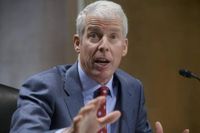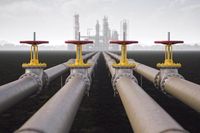The American government has granted a license for the construction of a new liquefied natural gas (LNG) export facility in Louisiana, marking the fifth project of its kind to gain approval since President Donald Trump resumed office. This decision, authorized by the Department of Energy, involves the construction of the "Venture Global CP2" project in Cameron County, Louisiana.
The approval of the facility has been met with enthusiasm from the oil sector but has drawn significant criticism from environmental protection organizations. The announcement synchronously occurred with a meeting between major American oil companies and President Trump at the White House, signaling strong governmental support for the oil industry.
U.S. Energy Secretary Chris Wright articulated the administration’s objectives, stating, "We seek to provide reliable, affordable, and secure energy for Americans and allies worldwide." This reflects the broader energy policy under the current administration aimed at bolstering domestic oil production.
This latest approval contrasts sharply with the earlier stance taken by former Democratic President Joe Biden, who in early 2024 halted all new LNG projects amidst serious environmental concerns. Biden's decision was grounded in the potential ecological threats posed by such developments, thus initiating a halt to projects similar to the one recently approved.
In the wake of the announcement, environmental activists have fiercely criticized the new project, viewing it as a severe threat to the environment. Organizations dedicated to ecological preservation have raised alarms about the potential implications of increased natural gas production and exportation on climate change and local ecosystems.
Furthermore, the meeting at the White House brought together various leaders in the oil industry, raising concerns over the economic implications of Trump's trade policies. While these titans of the oil sector have maintained a relatively quiet public disposition regarding trade tariffs imposed by the Trump administration, insiders hint at growing unease about the long-term effectiveness of these economic strategies.
Industry leaders are acknowledging the dual challenges they face: the push for increased oil production and the mounting pressure from environmental groups. Many oil executives privately share their skepticism about the sustainability of Trump's trade policies while publicly supporting the administration's energy initiatives.
The approval of the "Venture Global CP2" facility signifies a notable step in the Trump administration's agenda to rejuvenate the oil sector, a goal that has been met with mixed reactions across the political spectrum. Proponents argue that such projects drive economic growth and energy independence, while critics emphasize the urgent need for environmentally friendly energy solutions.
As the debate continues, questions loom regarding the future of environmental regulation in the face of aggressive oil industry expansion. Organizations and activists are gearing up for further protests and advocacy work, demanding more substantial commitments to renewable energy and stringent environmental safeguards from the government.
The tensions between economic growth fostered by fossil fuel development and the imperatives of climate change have sparked a heightened public discourse around energy policy. With new projects on the horizon, how the government balances these competing demands will likely shape the future of the energy landscape in America.
As the oil industry's momentum gains traction with the approval of the new LNG facility, critics warn that hastily approved projects may exacerbate environmental degradation rather than solve energy challenges. The urgency for a coherent energy policy that embraces both economic and environmental objectives has never been more pronounced.
In conclusion, the approval of the "Venture Global CP2" project symbolizes both a continuation of an energy strategy championed by the Trump administration and a flashpoint for the ongoing debate about the future of energy in America. The choices made in the coming months have the potential to redefine the nation’s energy policies for years to come.






